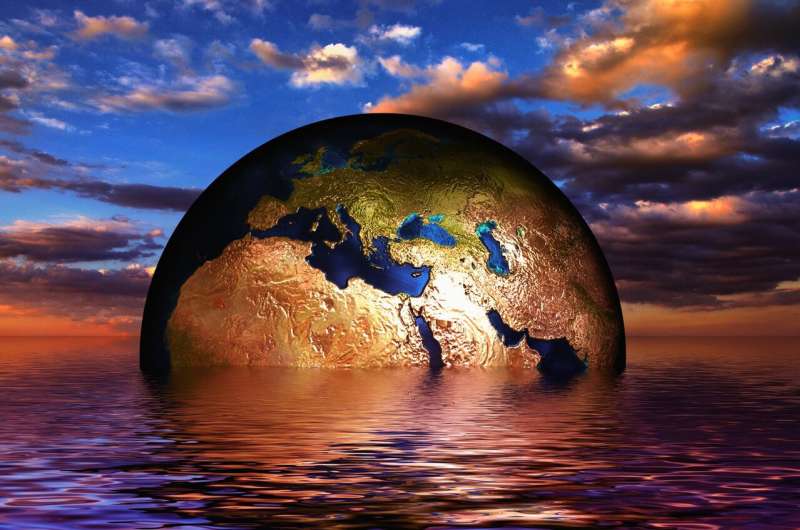Everything science knows about climate change and the future of the world’s largest economies

On the eve of the G20 meeting in Italy, the CMCC Foundation—Euro-Mediterranean Center on Climate Change releases the G20 Climate Risks Atlas. Impacts, policy, economics, a series of Country Factsheets which summarizes scientific projections of how climate impacts will play out in the world’s most industrialized countries over the coming decades.
Based on the most advanced scientific knowledge available on the topic, the study is the first of its kind, and the Atlas is easy to be consulted, designed with a mix of infographics, maps and short narrative descriptions in a simple language. Impacts, risks, and interactions with climate change that are expected by the middle and end of the century are assessed at the national level, under different degrees of warming and development models, with an in-depth analysis of key sectors of the G20 economies.
The report, that is realized with the support of European Climate Foundation and with the scientific contribution of Enel Foundation, finds that under the worst-case scenario, without urgent action to reduce carbon emissions, GDP losses due to climate damage in G20 countries increase each year, rising to at least 4% annually by 2050. This could reach over 8% by 2100, equivalent to twice the bloc’s economic losses from COVID-19. Some countries will be even worse hit, such as Canada, which could see at least 4% knocked off its GDP by 2050 and over 13%—€133 billion—by 2100.
Conversely, the faster G20 countries adopt low-carbon policies, the less the climate impacts cascade and the more manageable they become. Limiting temperature rise to 2°C could see the cost of climate impacts in the G20 drop to just 0.1% of its total GDP by 2050 and 1.3% by 2100.
Prof. Donatella Spano, member of the CMCC Strategic Board and coordinator of the G20 Climate Risks Atlas. Impacts, policy, economics, said: “From droughts, heatwaves and sea level rise, to dwindling food supplies and threats to tourism—these findings show how severely climate change will hit the world’s biggest economies unless we act now. As scientists, we know that only rapid action to tackle emissions and adapt to climate change will limit the severe impacts of climate change. We trust that in the process of a sustainable transition, climate change will be considered the fundamental pillar of the political agenda.”
From coastal erosion to the spread of tropical diseases, every G20 country is at risk from the impacts of climate change. The research shows that rising temperatures and intense heatwaves could cause severe droughts, threatening essential water supplies for agriculture, causing huge loss of human life and increasing the chance of fires.
Heatwaves could last at least ten times longer in all G20 countries, with heatwaves in Argentina, Brazil and Indonesia lasting over 60 times longer by 2050. In Europe, deaths from extreme heat could rise from 2,700 per year to 90,000 each year by 2100 on a high emissions pathway.
Climate change will affect food security: in India, declines in rice and wheat production could spark economic losses of up to €81 billion by 2050 and a loss of 15% of farmers’ incomes by 2100. By 2050, the potential fish catch could fall by a fifth in Indonesia—uprooting hundreds of thousands of livelihoods.
Sea level rise could damage coastal infrastructure within 30 years, with Japan set to lose €404 billion and South Africa €815 million by 2050, on a high emissions pathway.
In Australia, bushfires, coastal floods, and hurricanes could raise insurance costs and reduce property values by $611 billion AUD by 2050.
If all 2030 climate targets are met, the planet will heat by 2.7 C this century
Spano, D, et al, G20 Climate Risk Atlas. Impacts, policy and economics in the G20, (2021). DOI: 10.25424/CMCC/G20_CLIMATERISK
Provided by
CMCC Foundation – Euro-Mediterranean Center on Climate Change
Citation:
Everything science knows about climate change and the future of the world’s largest economies (2021, October 28)
retrieved 28 October 2021
from https://phys.org/news/2021-10-science-climate-future-world-largest.html
This document is subject to copyright. Apart from any fair dealing for the purpose of private study or research, no
part may be reproduced without the written permission. The content is provided for information purposes only.
For all the latest Science News Click Here
For the latest news and updates, follow us on Google News.

